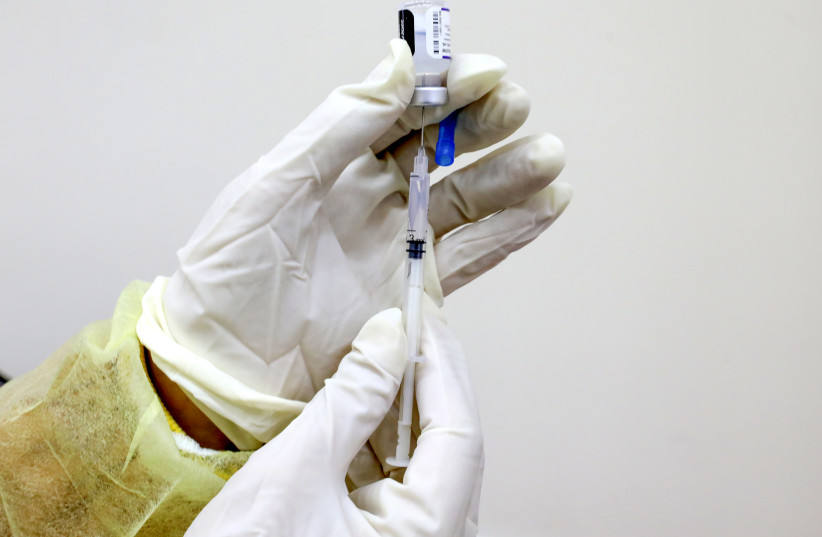In a major breakthrough in the battle with the COVID-19 pandemic, Tel Aviv University researchers have isolated two antibodies that neutralize all known strains of COVID-19 – including Omicron – with up to 95% efficiency and will strengthen the immune systems of people at risk.
Targeted treatment with antibodies and their delivery to the body in high concentrations may serve as an effective substitute for vaccines, especially for at-risk populations and those with weakened immune systems, according to the researchers. By using antibody treatment, there is a possibility that the need to provide repeated booster shots to the entire population every time a new variant emerges will be eliminated.
The research was led by Dr. Natalia Freund and doctoral students Michael Mor and Ruofan Lee of the Department of Clinical Microbiology and Immunology at Tel Aviv University’s Sackler Faculty of Medicine. The study was conducted in collaboration with Dr. Ben Croker of the University of California at San Diego. Also taking part in the study were Prof. Ye Xiang of Tsinghua University in Beijing, Prof. Meital Gal-Tanamy and Dr. Moshe Dessau of Bar-Ilan University.
The study was published in the journal Communications Biology under the title “Conformational flexibility in neutralization of SARS-CoV-2 by naturally elicited anti-SARS-CoV-2 antibodies.”
The new research is a continuation of a preliminary study conducted in October 2020 at the height of the COVID-19 pandemic. Then, Freund and her colleagues sequenced all the B immune system cells from the blood of Israelis who had recovered from the original COVID strain and isolated nine antibodies that the patients produced. The researchers now found that some of these antibodies are very effective in neutralizing the new coronavirus variants, Delta and Omicron.

“In the previous study, we showed that the various antibodies that are formed in response to infection with the original virus are directed against different sites of the virus,” said Freund. “The most effective antibodies were those that bound to the virus’s ‘spike’ protein, in the same place where the spike binds the cellular receptor ACE2.
"Of course, we were not the only ones to isolate these antibodies, and the global health system made extensive use of them until the arrival of the different variants of the coronavirus, which in fact rendered most of those antibodies useless."
Natalia Freund
“In the current study, we proved that two other antibodies named TAU-1109 and TAU-2310 that bind the viral spike protein in a different area from the region where most of the antibodies were concentrated until now (and were thus less effective in neutralizing the original strain) are actually very effective in neutralizing the Delta and Omicron variants.
“According to our findings, the effectiveness of the first antibody, TAU-1109, in neutralizing the Omicron strain is 92% and in neutralizing the Delta strain it is 90%. The second antibody, TAU-2310, neutralizes the Omicron variant with an efficacy of 84%, and the Delta variant with an efficacy of 97%,” said Freund.
How are the antibodies so effective?
THE SURPRISING effectiveness of these antibodies might be related to the evolution of the virus, she suggested.
“The infectivity of the virus increased with each variant because each time, it changed the amino acid sequence of the part of the spike protein that binds to the ACE2 receptor, thereby increasing its infectivity and at the same time evading the natural antibodies that were created following vaccinations.
“In contrast, the antibodies TAU-1109 and TAU-2310 don’t bind to the ACE2 receptor binding site, but to another region of the spike protein – an area of the viral spike that for some reason does not undergo many mutations – and they are therefore effective in neutralizing more viral variants. These findings emerged as we tested all the known COVID strains to date.”
The two antibodies, cloned in her Tel Aviv University lab, were sent for tests to check their effectiveness against live viruses in laboratory cultures at the University of California San Diego and against pseudo-viruses in the labs of the Faculty of Medicine of Bar-Ilan University. The results were identical and equally encouraging in both tests.
Freund said she believes the antibodies can bring about a real revolution in the fight against COVID-19.
“We need to look at the COVID-19 pandemic in the context of previous disease outbreaks that humankind has witnessed. People who were vaccinated against smallpox at birth and who today are 50 years old still have antibodies, so they are probably protected, at least partially, from the monkeypox virus that we have recently been hearing about. Unfortunately, this is not the case with the coronavirus.”
For reasons still not fully understood, the level of antibodies against COVID-19 declines significantly after three months, which is why people are repeatedly infected, even after being vaccinated three times.
“In our view, targeted treatment with antibodies and their delivery to the body in high concentrations can serve as an effective substitute for repeated boosters, especially for at-risk populations and those with weakened immune systems. COVID-19 infection can cause serious illness, and we know that providing antibodies in the first days following infection can stop the spread of the virus.
“It is, therefore, possible that by using effective antibody treatment, we will not have to provide booster doses to the entire population every time there is a new variant,” Freund concluded.
